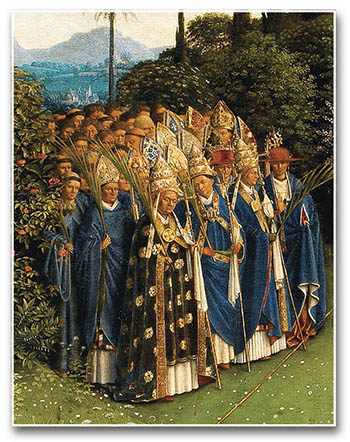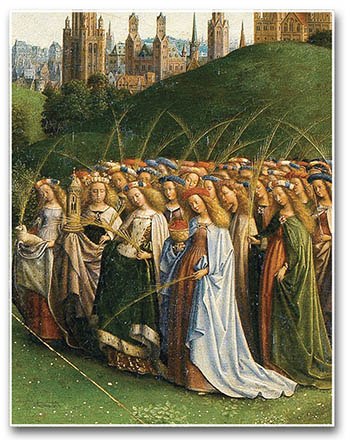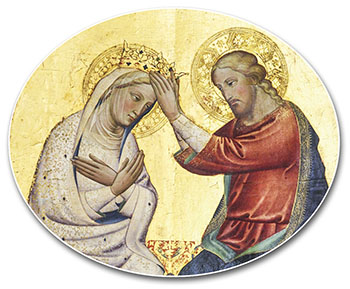The present crossroads of anxiety and discontent reigning throughout the whole world can be viewed as an effect of impiety and moral corruption, which in turn produce the great “challenges of the world: materialism, relativism, secularism.”1 We are suffering from a conflict of numerous disorders. An immense oppression weighs upon us, and it is futile to try to mask the gravity of the present moment.
The apparitions of Fatima open our eyes to a serious and tragic reality: they show the offenses suffered by the Hearts of Jesus and Mary, and the catastrophic consequences of this situation for humanity. Thus, Fatima invites the faithful to live within a spirit of seriousness and conviction; we could even say compunction.
Our Lady manifested her very insightful prophetism to the little shepherds, not only to foretell future events, but also, and principally, to show the world the sole way to avoid the debacle. In Fatima, Mary Most Holy places modern man before a great crossroads: conversion or the ruin of the present neo-paganized society.
Nevertheless, many erroneously think that we find ourselves on a type of dead-end street. It is not so. For Our Lady shows us the solution. The alternative She presented is neither to choose war nor peace, but what the Blessed Virgin wanted to say in Fatima is: “Choose virtue! Choose faith! Believe in what I said, and amend your lives!”2
To go directly to the point, let us make an analysis of the highest aspect of human society: the Holy Roman Catholic and Apostolic Church, a divine institution founded by Our Lord Jesus Christ during His earthly mission, and depository of all the heavenly treasures that humanity needs for salvation.
What is the state of the Church in our days? We cannot help but smile at those who would ingenuously tell us that it is good! The state of the Church is only good when the culture, laws, institutions and family life are in accordance with the Law of God. And this is not the case today. Nothing could be more evident.
A message spread but not put into practice
We will not discuss here the widespread diffusion of the message of Our Lady in the apparitions of Fatima, considering that, unfortunately, the large majority of mankind has not truly heeded her requests on one fundamental point: they have not put into practice a change in behaviour nor an amendment of life and habits. Humanity is not ready to beat its chest and make an act of humility, admitting its errors and sins.
Thus, the state of mind that Our Lady hoped to instil throughout the Catholic world, of seriousness and combativeness against the sins of the present age so as to work the regeneration of the world, has been relegated to oblivion due to a chronic superficiality that closes spirits to everything that is sublime, lofty and noble, like the prophecies of Fatima.
Even though proclaimed in so many places of the world, one could say that the message transmitted to the little shepherds is the forgotten one par excellence. This very well-known and brilliant event, admitted by everyone and witnessed by thousands, has been cast into oblivion. An oblivion that has resulted not merely from blameless distraction, but rather from torpor, indifference and a rejection by those who do not wish to abandon the sinful comfort that the atheistic world of today offers, so as to not have to give oneself to the practice of the virtues and the Ten Commandments.
A societal change in the direction of true conversion is becoming more improbable: to the degree that we march toward the climax of moral degradation, the realization of the punishments prophesied by Our Lady become more likely.
Need for greater fervor in devotion to Immaculate Heart of Mary
We are now more than two decades into the twenty-first century: how can we foster the conversion of sinners and usher in as quickly as possible the blessed dawn of the Reign of Mary? Our Lady told us: greater fervor in devotion to her Immaculate Heart, in prayer and in penance.
The Virgin of Fatima insisted in a very special way on devotion to her Immaculate Heart. Over the course of the apparitions, She made mention of her Heart more than seven times. In Fatima, the theological importance of devotion to the Immaculate Heart, in fact, already well-proven, finds a precious and impressive confirmation.
Consequently, those who wish to take the revelations of Fatima seriously should increase their devotion to the Most Pure Heart of Mary, and consider it among the loftiest and most salutary advances they can make in their spiritual life.
However, someone might ask: what good is it if only a few people practice this devotion? Will the world convert because of this? Can this chastisement be avoided? The answer lies in the words of Our Lady when She showed Sister Lucia her Heart surrounded by thorns: “You at least try to console me.”3 We must desire to be these consoling children of Mary Most Holy!
A voice capable of awakening the most heartening confidence
Having made these reflections, we pause to consider the final perspectives of the message of Fatima. For Catholics who ardently hope for God’s intervention in these very trying and confused times, this message is conditional, for it brings with it a maternal warning at the same time that it promises a reward if it be heeded and put into practice by humanity. However, “those who have faith can hear a voice coming from beyond this confused and grim horizon, capable of awakening the most heartening confidence: ‘In the end, my Immaculate Heart will triumph!’ What credence can be given to this voice? The answer is but one brief phrase, coming from this same voice: ‘I am from Heaven.’ Therefore, there are reasons to hope. Hope for what? The help of Providence in any work done with methodical vision and rigour to drive away the threats hanging over humanity, like so many swords of Damocles.”4
Thus, beyond the affliction and the very probable chastisements towards which we walk, we have before us the first sacral rays of the dawn of the Reign of Mary, which will be, without doubt, the victory of the maternal and regal Heart of the Blessed Virgin. It is a majestic promise that brings peace, enthusiasm and light!
St. Louis-Marie Grignion de Montfort also encourages the faithful in the hope of the advent of this Reign of Mary. In True Devotion to Mary, the French Saint ardently clamours with the profound faith that characterizes him: “When will that happy day come, when God’s Mother is enthroned in men’s hearts as Queen, subjecting them to the dominion of her great and princely Son? When will souls breathe Mary as the body breathes air?”5
There is no doubt that in this future prevision, still distant in time from St. Louis de Montfort, there remains an intimate association with the triumph of the Immaculate Heart of Mary announced by Our Lady in Fatima. In those happy times, the Blessed Virgin would establish her reign in souls, in institutions, in nations and throughout the earth.
Chosen ones of Our Lady

With the modern world inundated with crime and sin, foreboding a period of trial for authentic Catholics, someone might forget that Divine Providence, in His zeal for men, will raise up in the Church ardent souls steadfast in faith, to whom in some way He will make known His designs and use them to further His victory.
Who will these chosen ones of Our Lady be? According to our analysis, we believe they will be a notable minority coming together from all the corners of the earth. Each one, according to the wise will of Mary Most Holy, will receive admirable graces to overcome difficult obstacles, and will at times believe they have completely failed. However, if they confide until the end, they will have the joy of contemplating with their eyes the glorious beginning of the Marian era soon to come.

In his Prayer for Missionaries, St. Louis de Montfort also foretells: “It is to be a congregation, a gathering, a selection, a picked handful of predestined men to be chosen by you from among those who are in the world: Ego elegi vos de mundo (Jn 15:19). You are to select from all these fierce wolves a flock of peaceful sheep; from all these ugly crows, a flight of pure doves and royal eagles; from all these buzzing hornets, a swarm of honey-bees; from all these slow-moving tortoises, a herd of nimble deer; from all these timid hares, a pride of bold lions. Lord, congrega nos de nationibus (Ps 105:47). Bring us together and unite us and may all the glory be given to your holy and mighty name!”6
These can be compared to water which, by a desire of Our Lady expressed to her Divine Son, is transformed into the wine of the Wedding of Cana. They are souls who, of themselves, have only the value of water. Nevertheless, with the gaze of the Blessed Virgin having rested upon them, Our Lord transforms them into a precious wine, with the best graces and favours He has saved for this Marian era.
A new miracle of Cana
Dr. Plinio makes an interesting analogy of this biblical episode, starting from some well-known details of the event:
“In the first place, there is a crisis: the wine runs out, thereby creating a state of anguish and distress for the owner of the house. Behold, Our Lady comes to the rescue, intervenes and asks Our Lord’s help.
“The Divine Master, after an apparent refusal, for His time had not yet come, heeds the supplication of Mary Most Holy and works the stupendous miracle of changing water into wine. Our Lady, who obtains everything, manages to get something of a premature miracle from Our Lord.
“The Gospel scenario depicts well the present time humanity is passing through. Indeed, do we not also live in a state of anguish? Can it not be said that men of today are like the guests of that feast? They lack the generous wine of virtue and faith, which they have insanely squandered, plundered and, finally, rejected.
“And in this state of crisis, Our Lady says to her Divine Son: ‘They have no wine; they do not have Thy most precious Blood; they do not have the superabundant graces necessary to convert and change the situation.’ And Our Lord, irate with men, replies to Her: ‘What have we to do with them? My time has not yet come.’
“Therefore, just as at the Wedding of Cana, when Our Lady, with her immaculate serenity, said to the servants to do everything Our Lord ordered them to do, and He ended up changing water into wine, transforming a common and trivial liquid into a marvelous wine, the best drink of the feast; the same will happen with the contemporary world: an old, worn out, broken world, where to the putrefaction of pagan nations is added the corruption of neo-pagan nations. However, by the omnipotent supplications of the Blessed Virgin there will be a transformation, a grand retour,7 an immense return of repentant souls to the eternal values of the Catholic Faith. Then, the water will be transformed into excellent wine, the best of history: it will be transformed into the Reign of Mary.”8

Certainty of Mary’s victory!
Historical events are proof that all human progress is essentially founded upon the fidelity of souls to Our Lord and God and their intimate union with Him, from which flows, in its turn, the entire and splendorous harmony of relationships among men. For this reason, the fruit of the kingdom that will come will be the peace that the great institutions were never able to obtain, for they had taken God from the center of their thoughts. Peace! True peace is the peace of Christ in the reign of Christ.
And it is not without reason that St. Louis Grignion de Montfort asks the Lord: “Ut adveniat regnum tuum, adveniat regnum Mariæ.”9 For She, as Mother of the King, cannot be other than Queen, as we can see in the writing of the Mellifluous Doctor, while singing the praises of the sovereignty that She received upon ascending into Heaven: “Is someone capable of imagining the glory that today envelops the Queen of the world, the enthusiasm with which all the celestial legions come out to meet Her, the hymns with which they accompany Her to her glorious throne? Her Son receives Her with such an affable countenance, tender gaze and divine embrace! She is exalted above every creature, with the honor worthy of this Mother and the glory fitting to this Son.”10
It is with jubilant expectation that we conclude this article, in the certainty and confidence of the victory of She who is incapable of deceiving, for She promised: In the end, my Immaculate Heart will triumph! ◊
Taken, with minor adaptations, from:
“In the end, my Immaculate Heart will triumph!”
Nobleton: Heralds of the Gospel Canada, 2017, p.105-132
Notes
1 BENEDICT XVI. Homily in Savona, 17/5/2008.
2 CORRÊA DE OLIVEIRA, Plinio. Conversation. São Paulo, April 12, 1985.
3 SISTER LUCIA. Fatima in Lucia’s own words. Appendix I. Fatima, Portugal: Postulation Centre, 1976, p.195.
4 CORRÊA DE OLIVEIRA, Plinio. Nobreza e elites tradicionais análogas nas alocuções de Pio XII ao patriciado e à nobreza romana. Porto: Civilização, 1993, p.154-155.
5 ST. LOUIS-MARIE GRIGNION DE MONTFORT. True Devotion to Mary, n.217. In: God Alone. Bayshore, NY: Montfort Publications, 1987, p.360.
6 ST. LOUIS-MARIE GRIGNION DE MONTFORT. Prayer for Missionaries, n.18. In: God Alone, op. cit., p.405.
7 From the French: grand return.
8 CORRÊA DE OLIVEIRA, Plinio. Conference. São Paulo, Jan. 29, 1967.
9 ST. LOUIS-MARIE GRIGNION DE MONTFORT, True Devotion to Mary, op. cit., p.360. From the Latin: “Lord, that Thy Kingdom may come, may the Reign of Mary come!”
10 ST. BERNARD OF CLAIRVAUX. Sermón Primero, en la Asunción de Santa María, n.4. In: Obras Completas. 2.ed. Madrid: BAC, 2006, v.IV, p.341.

